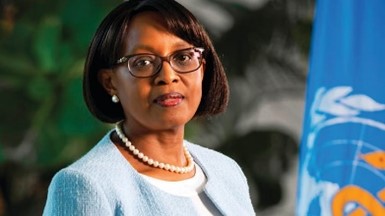15 Health Practitioners End TOT in Gbarnga
The Rebuilding Basic Health Services (RBHS) in collaboration with the Ministry of Health and Social Welfare, with funding from USAID has concluded a two-week intensive Training of Trainers workshop in Gbarnga, Bong County.
A total of 15 health practitioners from Bong, Nimba, Lofa and Grand Cape Mount counties, respectively benefited from the training on Integrated Community Case Management. The participants were mainly selected from RBHS partner organizations currently involved with the implementation of USAID-sponsored health programs in Liberia.
Speaking at the formal closing of the training workshop, the Quality Assurance and Community Health Advisor of RBHS, Catherine Gbozee, indicated the focus of the training was to empower the health workers with the requisite skills and knowledge needed to train semi-literate and illiterate community health volunteers in the management of malaria, diarrhea and pneumonia cases in their respective communities.
Madam Gbozee particularly stressed that malaria remains common in Liberia and it constitutes 35 percent of outpatients consultations with children under five years and pregnant women being the most vulnerable to the fast killing disease.
The RBHS Community Health Advisor assured the program would continue to work with the Ministry of Health and Social Welfare and its partners to ensure high impact evidence base interventions, such as community case management expansion especially hard to reach communities aimed at creating access and to save the lives of children under five years.
She disclosed RBHS, with funding from USAID is placing emphasis on community case management, judging from experience realized in a six-month community case management pilot project in Bong, Nimba, Lofa, and Gbarpolu counties, respectively.
She disclosed that evaluation conducted from the pilot project strongly suggests that community health volunteers if trained properly, adequately supervised and provided an uninterrupted drug supply can safely contribute to the reduction in child morbility and mortality.
In her keynote address to the participants, acting Assistant Health Minister for Preventive Services Mrs. Jessie E. Duncan, averred, the goal of the healthcare and social welfare program in Liberia is to expand access to quality, essential, health and social welfare services to the citizens.
[bsa_pro_ad_space id=1]
The acting Assistant Health Minister disclosed the 2011 accreditation report of the implementation of the basic package of health services implemented between 2007 and 2011 shows that access to health care services increased to more than seventy percent (70%) as compared to the 35% in 2006. She indicated this became attainable as a result of the collaborated effort exerted by the Ministry of Health and its partners over the years.
She said despite the improvement, more needs to be done in keeping with the 10-year national health policy 2011-2021, which seeks to increase access to quality health services to 100%, but can only be realized through collective commitment by various actors in the country’s health sector.
Minister Duncan puts the country’s current maternal mortality ratio at 994 per 100,000 deaths, which is very alarming.
















